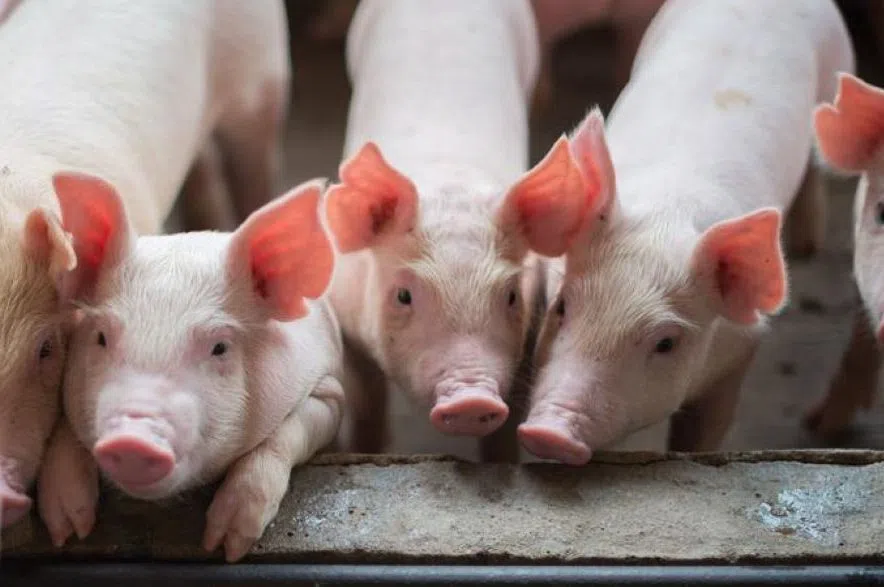China’s tariffs on $2.9 billion of exports from Canada — 100 per cent on canola oil and peas and 25 per cent on seafood and pork — have hit exports hard.
Chris White, president and CEO of the Canadian Meat Council, is currently in China and spoke to Vassy Kapelos about the impact of the tariffs on The Vassy Kapelos Show, which airs on Saturdays and replays on Sundays on 650 CKOM and 980 CJME.
Read more:
- Canada Votes 2025: Your trusted source for election coverage
- Tariffs & Saskatchewan: What do Trump’s tariffs mean for you?
- Who’s running in my riding? Saskatchewan’s federal election candidates
This transcript has been edited for length and clarity.
Kapelos: What impact are these tariffs from China are having on the industry you represent?
White: A 25-per-cent tariff on goods going into China is quite challenging. We had product on the water that was tariffed, so obviously that is quite difficult. It exacerbates a very unsettled market for the industry.
About three and a half years ago, Canada’s beef exports to China were fully suspended, so we have not had Canadian beef going into China for almost four years now. China is a critical market for the Canadian meat industry.
Kapelos: How critical is the Chinese market for the meat industry?
White: On the pork side, China imports a type of cut that most other countries globally do not take in. So if China has a tariff it effectively makes that part of the cut go to rendering. So that’s hundreds of millions of dollars that’s lost for industry.
The other element is the demographics of the middle class in China. Currently, there’s about 450 to 500 million middle-class Chinese. In the next 10 to 15 years that is expected to double to upwards of 900 to 950 million.
For Canadian agriculture companies and commodities trying to get in, it’s a very competitive and very lucrative market because of the size of the demographics.
Kapelos: What is the nature of the conversations that you’re having in China?
White: There’s certainly a desire on the part of the Chinese officials that I’ve met with — both on the official side and on the NGO side — to try and find a path forward.
Much like Canadians are waiting to see the outcome of the federal election, so too are Chinese officials. I think they have been quite frustrated with the state of the bilateral relationship between Canada and China.
They often talk about the desire to return to some sort of normalcy. Canada and China have historically a very productive relationship, dating back over half a century, so they’re looking to see that.
They’re looking to see what the new tone of the government is and if the government will look at taking off the tariffs, on EVs in particular.
Kapelos: How does the the U.S. taking aim at China with tariffs and the response from China relate to a potentially changing dynamic between Canada and China?
White: Certainly the officials I’ve spoken to are quite perplexed by how the Americans have treated Canada and they, they don’t really understand what position Canada finds itself in.
They often will say to me “you’re the little brother of the United States and you do exactly what they do.” And I always say “well, that’s not the case — Canada has an independent foreign policy.”
With the proximity and geography it makes sense we’re going to be doing a lot of trade with United States. But I would say fundamentally there’s a confusion, much like we as Canadians are confused by what has transpired over the last few weeks with the United States.
I don’t think most Chinese officials would have expected the Trump administration to have treated Canada as they have. So I think they’re waiting to see how it all plays out and if there is an opportunity perhaps for some modest increase in trade.
From a food security perspective, Chins wants and needs good quality products, which Canada can provide. More fundamentally, where Canada is differentiated from many countries is the world-class science through our Canadian Food Inspection Agency that underpins the quality of our food. So they want and they need our food and they know that.
Kapelos: Are you having conversations with the federal government about removing Chinese tariffs or will those not really be able to start in full until after the election?
White: We have certainly made our position clear to the federal government and wey we met just before the election was called. The timing is not great, but like any public policy with respect to any of our bilateral trading partners, there’s always conversations taking place.
Until the new government is elected and sworn in, we don’t anticipate any really significant public policy decision with respect to what a bilateral relationship with China looks like going forward, and certainly not on something as focused as the tariffs on EVs.
The government has much bigger things to do right now globally, but they’ll figure it out. When you look at what’s taking place in the European Union with how they’re evaluating EV tariffs on China, there’s always a ripple effect. So we don’t expect much any time soon.
Read more:











